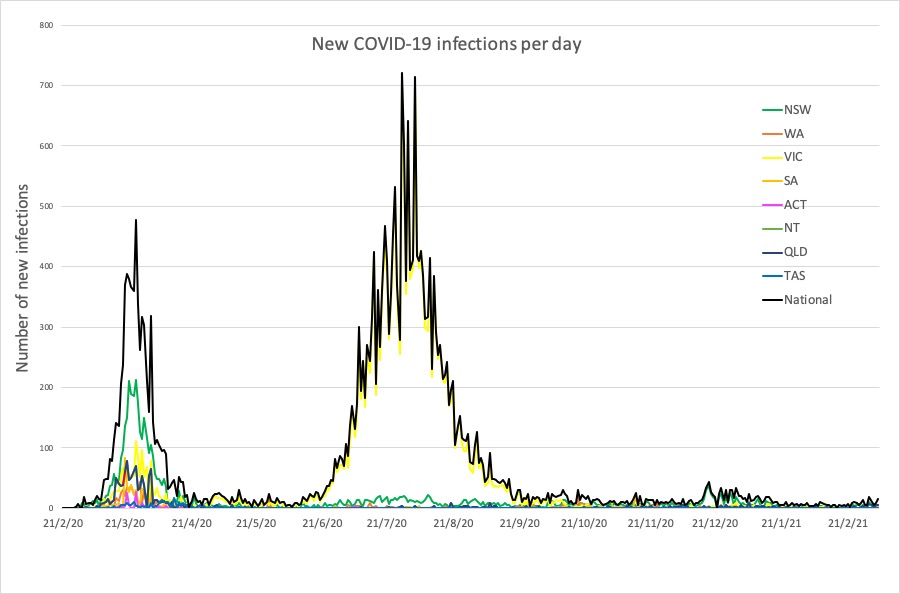And nearly 4% of professional athletes with mild COVID-19 show abnormal cardiac results.
Welcome to The Medical Republic’s COVID Catch-Up.
It’s the day’s COVID-19 news in one convenient post. Email bianca@biancanogrady.com with any tips, comments or feedback.
10 March
- Study finds increased postoperative mortality up to seven weeks after COVID-19 diagnosis.
- Nearly 4% of professional athletes with COVID-19 had abnormal cardiac test results.
- AHPRA issues statement on COVID-19 vaccination and healthcare workers.
- Global new infections increase for second week running.
- Latest COVID-19 infection numbers from around Australia.
Delay surgery for at least seven weeks after a COVID-19 diagnosis, say the authors of a study that found increased post-surgical mortality in patients who had been infected with SARS-CoV-2.
An international, multicentre, prospective cohort study, published in Anesthesia, looked at 30-day postoperative mortality in 140,231 patients, 2.2% of whom had been diagnosed with SARS-CoV-2 infection before surgery.
The adjusted 30-day mortality rate in patients who did not have SARS-CoV-2 infection was 1.5%. However mortality was more than three-fold higher among those who had received a COVID-19 diagnosis in the four weeks before surgery, and nearly 2.8-fold higher among those diagnosed in the 5-6 weeks before surgery.
In particular, the rate of postoperative pulmonary complications was significantly higher in those diagnosed with COVID-19 up to six weeks before surgery.
At seven weeks or more after a COVID-19 diagnosis, postoperative mortality and the rate of pulmonary complications was similar to the baseline, although this was not the case in those with ongoing COVID-19 symptoms, who showed the greatest risk of 30-day postoperative pulmonary complications.
“Decisions should be tailored for each patient, since the possible advantages of delaying surgery for at least 7 weeks following SARS-CoV-2 diagnosis must be balanced against the potential risks of delay,” the authors wrote.
Nearly one in 25 professional athletes who had mild COVID-19 has been found to have abnormal cardiac test results, according to a US study published in JAMA Cardiology.
As part of the push to return to play, professional sports leagues in the United States introduced mandatory cardiac screening for all players who had received a positive SARS-CoV-2 test.
Of the 789 professional athletes tested using troponin testing, electrocardiography and resting echocardiography, 3.8% had an abnormal result, and 0.6% had results suggesting inflammatory heart disease.
‘The low prevalence of clinically detectable inflammatory heart disease in this athlete population with non-severe COVID-19 illness offers a counterpoint to findings of higher rates of COVID-19 myocarditis and pericarditis reported in recent small cohort and CMR-based observational studies in athletes,” the authors wrote.
Health practitioners are strongly encouraged to get vaccinated against COVID-19, and those who object to receiving or administering the COVID-19 vaccine need to inform employers, colleagues and patients, says AHPRA.
A position statement on COVID-19 vaccination from AHPRA and the National Boards requires that all registered health practitioners and students be appropriately trained and qualified to administer the COVID-19 vaccines, and also provide accurate information and advice in any of their communications.
However the statement also deals with conscientious objectors, saying that they should inform patients but not discourage patients from seeking vaccination, and must also ensure they offer appropriate referral for vaccination.
The World Health Organisation has reported a second week of increased new COVID-19 infections globally, up 2% from the previous week, after an earlier six-week decline.
The increase is driven by infections in Europe, the eastern Mediterranean and Africa, but 80% of new infections and deaths are still coming from Europe and the Americas.
The latest update from WHO outlined the latest information on the three key variants of concern: the UK, South African and Brazil/Japan variants. All three appear to be associated with increased transmissibility, but only the UK variant so far has evidence to suggest increased severity.
The UK variant is the most widespread, and has now been detected in 111 countries, while the Brazil/Japan variant has only been found in 32 countries.
Here are the latest COVID-19 infection numbers from around Australia to 9pm Tuesday:
National – 29,061 with 909 deaths
ACT – 122 (0)
NSW – 5215 (6)
NT – 105 (0)
QLD – 1362 (5)
SA – 620 (2)
TAS – 234 (0)
VIC – 20,483 (1)
WA – 920 (1)



